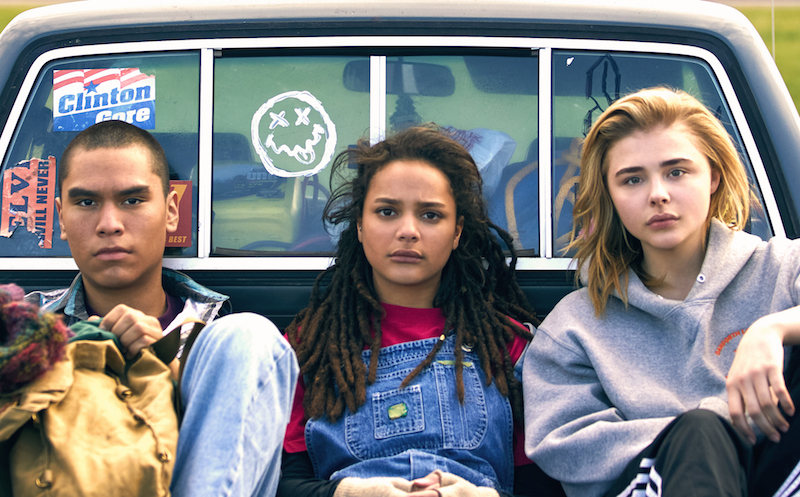
Desiree Akhavan’s The Miseducation of Cameron Post is the rare film that gets the grace notes right—lots of small moments of insight and humor and bits of character development that really resonated for me—but falls short on the bigger picture. I think this is partly because it’s an adaptation of a novel. Watching it, I couldn’t shake the nagging sense that some of the character depth and specificity was left out in the transition from page to screen.
As the film starts, our titular heroine (Chloë Grace Moretz) gets caught getting busy with the prom queen in the backseat of a car and is promptly sent to a Christian gay conversion therapy center called God’s Promise. The kids at the center can roughly be broken into two groups: those who resist and resent the treatment’s teachings and those who are consumed with self-loathing and hoping the center can save them from their sinful ways. The center is run by the exacting and humorless Dr. Lydia Marsh (Jennifer Ehle) and her brother, Reverend Rick (John Gallagher, Jr.), himself once guilty of the dreaded “SSA” (same sex attraction) but now living his life as a heterosexual man with a wife.
To me, Reverend Rick, who sings alt-rock Christian songs to the kids, seems to really care about his charges, and carries just a soupçon of sadness about him at all times (probably because he knows how bogus the center’s methods are) is the most fully realized and compelling character in the mix. Unsurprisingly, Gallagher’s performance is brilliant.
Cameron befriends two rebellious outsiders, the self-named Jane Fonda (Sasha Lane) and the Native American Adam (Forrest Goodluck). Jane was raised on a commune, but when her mom married a conservative, she got sent to this camp. (She’s also an amputee who stashes weed in her prosthetic leg.) Adam, who calls himself the Native American David Bowie—“I have the body of a man and the soul of woman,” he says—was forced into the center after his father decided to launch a political career.
But the problem with Jane and Adam and, more importantly Cameron, is that we never really get to know them beyond these snapshots. Cameron, for example, is an orphan being raised by her aunt, but we get no real sense of how losing her parents affected her or why her aunt would send her away, other than the fact that she’s quite religious. Grace-Moretz plays Cameron as brooding and cautious and watchful, except for when she’s not. At one point, Cameron jumps on a table and begins belting out Four Non Blonde’s “What’s Going On”—the film is set in 1993—and it seems wildly out of character. Later, she’s irreverent and forthright with both a social worker who visits the center and Father Rick, in ways we’ve never seen her behave before.
As for Jane, to drop the fact that she grew up on a commune and use it only as a signifier of her radical, doper, outsider status just seems lazy. Ditto on Adam’s Native American upbringing, which is only glancingly alluded to.
Again, many of the grace notes work. Reverend Rick has the participants in the center write on cartoon “icebergs”—the idea is that the homosexuality is just the tip of the iceberg—and fill them with observations and thoughts about what led them astray. One girl, Cameron’s roommate, thinks she got her SSA because her father made her watch too many sports. A guy thinks it’s because he spent too much time with his nurturing mother. Another boy tells Cameron that he wants to use his time at the center to “lean into his faith.”
“I don’t know if I have faith,” Cameron admits.
It’s moments like this that I wanted to see more of. The Miseducation of Cameron Post has flashes of greatness. And I love its empathic exploration of queer youth, especially from a female perspective. But I was left feeling vaguely unsatisfied. Guess I’ll go read the book.
The Miseducation of Cameron Post opens Friday, August 17 at the Parkway Theatre
